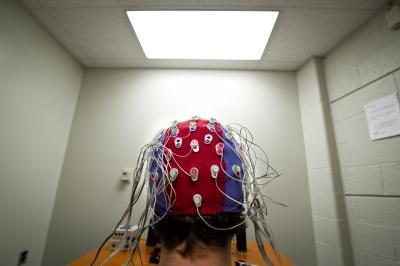Learning a new task when rules change can be a surprisingly difficult process and entail repeated mistakes, according to a new study. Take a US driver and put them in England where they suddenly have to drive on the left side of the road. The brain, trained for right-side driving, becomes overburdened trying to suppress the old rules while simultaneously focusing on the new rules - putting them on a moped if they are used to driving a car would make it even worse.
Study participants were given a computer task that involved recognizing the middle letter in strings such as "NNMNN" or "MMNMM." If "M" was in the middle, they were to press the left button; if "N" was in the middle, they were to press the right. After 50 trials, the rules were reversed so the participants had to press the right button if "M" was in the middle and the left if "N" was in the middle.

The electrode cap. Credit: MSU
Participants made more repeated errors when the rules were reversed, meaning they weren't learning from their mistakes. In addition, a cap measuring brain activity showed they were less aware of their errors. When participants did respond correctly after the rules changed, their brain activity showed they had to work harder than when they were given the first set of rules.
"We expected they were going to get better at the task over time," said Hans Schroder, a graduate student in Michigan State University's Department of Psychology and co-author of the study. "But after the rules changed they were slower and less accurate throughout the task and couldn't seem to get the hang of it."
Continually making these mistakes in the work environment can lead to frustration, exhaustion and even anxiety and depression, said Jason Moser, assistant professor of psychology and director of Michigan State University's Clinical Psychophysiology Lab.
"These findings and our past research suggest that when you have multiple things to juggle in your mind – essentially, when you are multitasking – you are more likely to mess up," Moser said. "It takes effort and practice for you to be more aware of the mistakes you are missing and stay focused."
Publishe in Cognitive, Affective&Behavioral Neuroscience




Comments